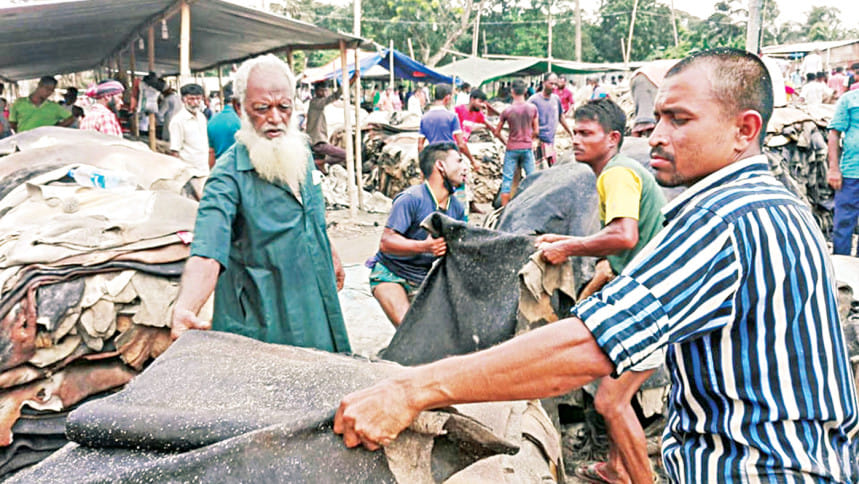Rawhide traders in a bind

Menazul Islam, a seasonal rawhide trader from Matikata Mor area of Chilmari upazila in Kurigram, is in dire straits after taking a Tk 2 lakh loan for his business in hopes of turning a profit.
He purchased the rawhide of cattle sacrificed during Eid-ul-Azha, which accounts for more than half of the rawhide collected annually, for a very low price this year.
As such, Islam aimed to make comparatively higher profits but he is yet to find rawhide wholesalers who are willing to buy the untanned leather at prices of his expectations.
He now fears a complete loss of capital. Islam bought each piece of cowhide in the range of Tk 120 to Tk 200 while those of goats for Tk 50 to Tk 70 this year.
The cost to process each cowhide was about Tk 500 while that of goats Tk 250.
Considering his investment, Islam hoped to sell each cowhide for Tk 800 to Tk 1,000 and that of goats for around Tk 500.
"Last year, we sold cow and goat hides for Tk 600-700 and Tk 300-400," he said.
This year though, seasonal rawhide traders are struggling to secure even half of their expected prices.
"We are eagerly waiting to sell the hides but many of us could not sell our goods as the prices offered by buyers is lower than the expected rate," said Sujon Rabidas, a seasonal rawhide trader based in Purbadhala upazila of Netrakona.
Echoing him, Nikhil Rabidas, a rawhide trader from Char Nilaxia village in Mymensingh sadar upazila, said the prices being offered were around half the government-set rate.
Besides, since traders are having to wait for days to sell their rawhides, the storage costs will continue to rise, he added.
As a result, more than 200 seasonal rawhide traders in Lalmonirhat and Kurigram are facing a bleak situation as they are yet to recoup their capital from sales to wholesalers.
According to the Department of Livestock Services, 1.66 lakh cattle were sacrificed in Kurigram while 1.25 lakh in Lalmonirhat this Eid.
Zahid Hossain, a rawhide trader at Alorupa area of Lalmonirhat town, told The Daily Star that he bought and processed rawhides worth Tk 25 lakh this year.
Hossain had to borrow about Tk 15 lakh to make this purchase and despite being pleased with their low cost, he has been unable to get his desired selling prices.
"We don't have any companies nearby to sell these rawhides to and so, we depend on wholesalers," he said.
"If I can't sell the hides in time, I will suffer a lot," Hossain added.
Similarly, around 1,000 rawhide traders in Mymensingh, Netrakona, Kishoreganj and Sherpur have been left disappointed by the low prices.
On July 31, traders took over 25,000 pieces of rawhide to Shambhuganj Rawhide Market in Mymensingh but only 10 per cent of it has been sold so far, according to Jahangir Alam, a leaseholder at the market.
He went on to say that the presence of wholesalers in the market is about 80 per cent less this year due to the ongoing coronavirus pandemic and subsequent restrictions on public movement.
Md Abdur Rahman, a representative of LIB Tannery in Dhaka, said he has so far bought 5,000 pieces of rawhide from Shambhuganj Rawhide Market. Last year, Rahman bought 20,000 rawhides from the market.
Asked about whether they have been making purchases at the government-set prices, Mohammad Amanullah, a representative of Dhaka Tannery, said if the government purchased skins at the fixed rate, he was ready to sell the 4,000 rawhides he had.
Dr Abdul Hai Sarkar, the local livestock officer of Kurigram district, told The Daily Star that the rawhide business was a national asset and should be preserved as such.

 For all latest news, follow The Daily Star's Google News channel.
For all latest news, follow The Daily Star's Google News channel. 



Comments